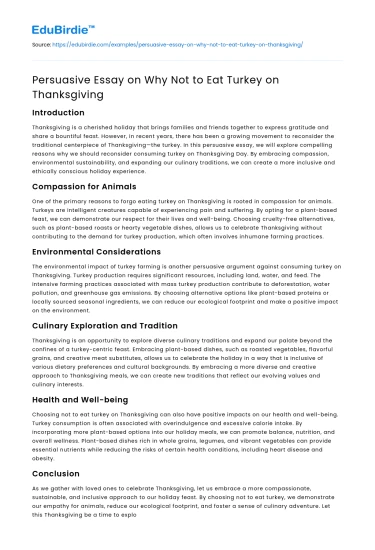Introduction
Thanksgiving is a cherished holiday that brings families and friends together to express gratitude and share a bountiful feast. However, in recent years, there has been a growing movement to reconsider the traditional centerpiece of Thanksgiving—the turkey. In this persuasive essay, we will explore compelling reasons why we should reconsider consuming turkey on Thanksgiving Day. By embracing compassion, environmental sustainability, and expanding our culinary traditions, we can create a more inclusive and ethically conscious holiday experience.
Compassion for Animals
One of the primary reasons to forgo eating turkey on Thanksgiving is rooted in compassion for animals. Turkeys are intelligent creatures capable of experiencing pain and suffering. By opting for a plant-based feast, we can demonstrate our respect for their lives and well-being. Choosing cruelty-free alternatives, such as plant-based roasts or hearty vegetable dishes, allows us to celebrate Thanksgiving without contributing to the demand for turkey production, which often involves inhumane farming practices.
Save your time!
We can take care of your essay
- Proper editing and formatting
- Free revision, title page, and bibliography
- Flexible prices and money-back guarantee
Environmental Considerations
The environmental impact of turkey farming is another persuasive argument against consuming turkey on Thanksgiving. Turkey production requires significant resources, including land, water, and feed. The intensive farming practices associated with mass turkey production contribute to deforestation, water pollution, and greenhouse gas emissions. By choosing alternative options like plant-based proteins or locally sourced seasonal ingredients, we can reduce our ecological footprint and make a positive impact on the environment.
Culinary Exploration and Tradition
Thanksgiving is an opportunity to explore diverse culinary traditions and expand our palate beyond the confines of a turkey-centric feast. Embracing plant-based dishes, such as roasted vegetables, flavorful grains, and creative meat substitutes, allows us to celebrate the holiday in a way that is inclusive of various dietary preferences and cultural backgrounds. By embracing a more diverse and creative approach to Thanksgiving meals, we can create new traditions that reflect our evolving values and culinary interests.
Health and Well-being
Choosing not to eat turkey on Thanksgiving can also have positive impacts on our health and well-being. Turkey consumption is often associated with overindulgence and excessive calorie intake. By incorporating more plant-based options into our holiday meals, we can promote balance, nutrition, and overall wellness. Plant-based dishes rich in whole grains, legumes, and vibrant vegetables can provide essential nutrients while reducing the risks of certain health conditions, including heart disease and obesity.
Conclusion
As we gather with loved ones to celebrate Thanksgiving, let us embrace a more compassionate, sustainable, and inclusive approach to our holiday feast. By choosing not to eat turkey, we demonstrate our empathy for animals, reduce our ecological footprint, and foster a sense of culinary adventure. Let this Thanksgiving be a time to explore the abundance of plant-based options available and create new traditions that reflect our evolving values. Together, we can make a difference and celebrate a Thanksgiving that is truly aligned with the spirit of gratitude, compassion, and conscious living.






 Stuck on your essay?
Stuck on your essay?

